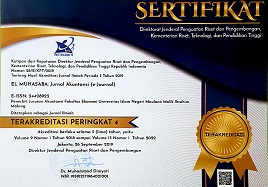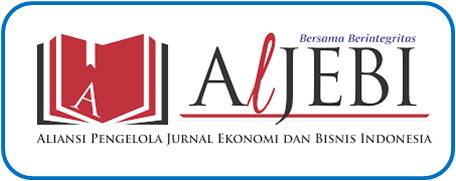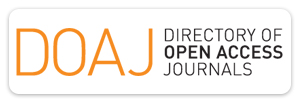Implementasi ISAK 35 pada Lembaga Perkreditan Desa
Abstract
Purpose: This study aims to design the format of the LPD financial statements referring to the Interpretation of Financial Accounting Standards (ISAK) 35 in accordance with the characteristics of the LPD.
Method: The research method used is Participatory Action Research (PAR) combined with Local Genius Values (LGV). The data comes from the experience and knowledge of researchers on LPD bookkeeping assistance in 2022.
Results: The results of the design of the bookkeeping format refer to SAK ETAP terminology which is non-profit oriented according to ISAK 35 based on the locality values of the Balinese indigenous people. The design of this bookkeeping format strengthens the characteristics of the LPD as an institution owned by indigenous peoples which is not a tax subject. The design of this bookkeeping format is expected to be an alternative consideration for various stakeholders to formulate standardized financial reporting policies for all LPDs that remain rooted in the local value characteristics of the Balinese indigenous people.
Implications: This study presents the new design of the bookkeeping format for LPDs in refer to Interpretation of Financial Accounting Standards (ISAK) 35 and the characteristics of LPD.
Novelty: This study has a novelty related to the design of the bookkeeping format for LPD in refer to Interpretation of Financial Accounting Standards (ISAK) 35.
Keywords
Full Text:
PDFReferences
Achadiyah, B. N. (2019). Otomatisasi Pencatatan Akuntansi Pada UMKM. Jurnal Akuntansi Multiparadigma, 10(1). https://doi.org/10.18202/jamal.2019.04.10011
Aspers, P., & Corte, U. (2019). What is Qualitative in Qualitative Research. Qualitative Sociology, 42(2), 139–160. https://doi.org/10.1007/s11133-019-9413-7
Atmadja, A. T. (2013). LPD as The Embodiment of Financial Institutions Based on Social Capital in Bali, Indonesia. Review of Integrative Business & Economics Research, 2(2), 483–490.
Bagiada, I. M., & Darmayasa, I. N. (2015). Implementasi Filosofi Tri Hita Karana Dalam Pengungkapan Tanggung Jawab Sosial Pada Lembaga Perkreditan Desa (LPD). Simposium Nasional Akuntansi Vokasi IV, 798–815.
BPS Provinsi Bali. (2022). Tinjauan Perekonomian Bali 2021. Badan Pusat Statistik Provinsi Bali.
Burnama, I. (2019). Pemanfaatan e-Bupot Untuk Meningkatkan Kepatuhan Wajib Pajak. Indonesian Tax Review, 80–83.
Darmayasa, I. N., & Aneswari, R. Y. (2015). The ethical practice of tax consultant based on local culture. Procedia - Social and Behavioral Sciences, 211(September), 142–148. https://doi.org/doi: 10.1016/j.sbspro.2015.11.021
Darmayasa, I. N., & Aneswari, Y. R. (2016). The Role of Local Wisdom Toward Tax Compliance. Jurnal Akuntansi Multiparadigma, 7(1), 110–119.
Darmayasa, I. N., Arsana, I. M. M., Putrayasa, I. M. A., & Larasati, P. I. (2022). Reconstruction of Compliance Risk Management Towards a Humanist Approach. International Conference on Applied Science and Technology on Social Science 2021 (ICAST-SS 2021), 647, 492–498. https://doi.org/https://doi.org/10.2991/assehr.k.220301.081
Darmayasa, I. N., Sudarma, I. M., Achsin, M., & Mulawarman, A. D. (2018). Constructed interpretation of tax compliance through the historicity, rationality, and actuality of Pancasila (cases in Indonesia). International Journal of Trade and Global Markets, 11(1/2), 67–76. https://doi.org/DOI: 10.1504/IJTGM.2018.092481
Dewi, N. K. U. K. (2021). Internalisasi Tri Hita Karana Dalam Usaha Pencegahan Fraud Pada Lembaga Perkreditan Desa (LPD) Bali Indonesia. Accounting and Business Information Systems Journal, 9(4), 1–18.
DGT. (2021). Susunan dalam Satu Naskah Undang-Undang Perpajakan Edisi 2021 dengan Perubahan UU CIPTAKER. Direktorat P2Humas DJP.
Fuadi, M. dan Y. (2013). Pengaruh Kualitas Pelayanan Petugas Pajak, Sanksi Perpajakan dan Biaya Kepatuhan Pajak Terhadap Kepatuhan Wajib Pajak UMKM. Tax & Accounting Review, 20.
IAI. (2009). Standar Akuntansi Keuangan Entitas Tanpa Akuntabilitas Publik. Salemba Empat.
IAI. (2019). Standar Akuntansi Keuangan Efektif per 1 Januari 2018 (Cetakan Ke). Ikatan Akuntan Indonesia.
Kim, T. (2021). Does a Manager Respond to a Going-Concern Audit Opinion with an Asymmetry in Gain and Loss ? Sustainability 2021, 13, 25–44. https://doi.org/https://doi.org/10.3390/su13084425
LP LPD. (2022a). LP LPD (2022) Blue Print Lembaga Perkreditan Desa (LPD) Tahun 2018-2022. Lembaga Pemberdayaan Lembaga Perkreditan Desa Adat.
LP LPD. (2022b). Pedoman Administrasi Pembukuan dan Laporan Lembaga Perkreditan Desa (LPD). Lembaga Pemberdayaan Lembaga Perkreditan Desa Adat.
Lune, H., & Berg, B. L. (2017). Methods for the Social Sciences Global Edition.
Mangoting, Y. (2018). Quo Vadis Kepatuhan Pajak? Jurnal Akuntansi Multiparadigma, 9(3), 451–470.
https://doi.org/10.1515/9783110459418-037
Peraturan Daerah Provinsi Bali No. 3 Tahun 2017. (2017). Lembaga Perkreditan Desa. Sekretaris Daerah Provinsi Bali.
Peraturan Gubernur Bali No. 44 Tahun 2017. (2017). Peraturan Pelaksanaan Peraturan Daerah Provinsi Bali No. 3 Tahun 2017 tentang Lembaga Perkreditan Desa. Sekretaris Daerah Provinsi Bali.
Pertiwi, I. D. A. E., & Ludigdo, U. (2013). Implementasi Corporate Social Responsibility Berlandaskan Budaya Tri Hita Karana. Jurnal Akuntansi Multiparadigma, 4(3), 430–455.
Primanta, I. G. Y., Sudarma, M., & Mulawarman, A. D. (2018). Ambiguitas Perlawanan Pajak Lembaga Perkreditan Desa (Studi Fenomenologi Pada Lembaga Perkreditan Desa Di Provinsi Bali). Jurnal Akuntansi Aktual, 5(2), 136–148. https://doi.org/10.17977/um004v5i22018p136
Putri, N. K., Adawiyah, W. R., & Pramuka, B. A. (2017). Independence of audit ethical decision making process: A case of Indonesia. DLSU Business and Economics Review, 26(2), 115–124.
Qutoshi, S. B. (2018). Phenomenology: A Philosophy and Method of Inquiry. Journal of Education and Educational Developement, 5(1), 215–222.
http://jmsnew.iobmresearch.com/index.php/joeed/article/view/157
Riana, I. G. (2021). Influence of Spiritual Leadership. Journal of Asian Finance, Economics and Business, 8(2), 1111–1124. https://doi.org/10.13106/jafeb.2021.vol8.no2.1111
Sudrajat, A., & Ompusunggu, A. P. (2015). Pemanfaatan Teknologi Informasi, Sosialisasi Pajak, Pengetahuan Perpajakan, dan Kepatuhan Pajak. Jurnal Riset Akuntansi Dan Perpajakan JRAP, 2(2), 193–202.
UU No. 1 Tahun 2013. (2013). Lembaga Keuangan Mikro. Menteri Hukum dan Hak Asasi Manusia Republik Indonesia.
Wirajaya, G. A., Sudarma, M., Ludigdo, U., & Djamhuri, A. (2014). The Accountability in the Dimension of Tri Hita Karana (THK). Scientific Research Journal, II(VIII), 10–17.
DOI: https://doi.org/10.18860/em.v14i2.20514
Refbacks
- There are currently no refbacks.
Editorial Office:
Megawati Soekarnoputri Building
Accounting Department, Faculty of Economics
Jln. Gajayana 50 Telp (0341) 558881
E-mail: elmuhasaba@uin-malang.ac.id
Universitas Islam Negeri Maulana Malik Ibrahim Malang
E-ISSN 2442-8922
P-ISSN 2086-1249

This work is licensed under a CC BY SA 4.0 International License

















